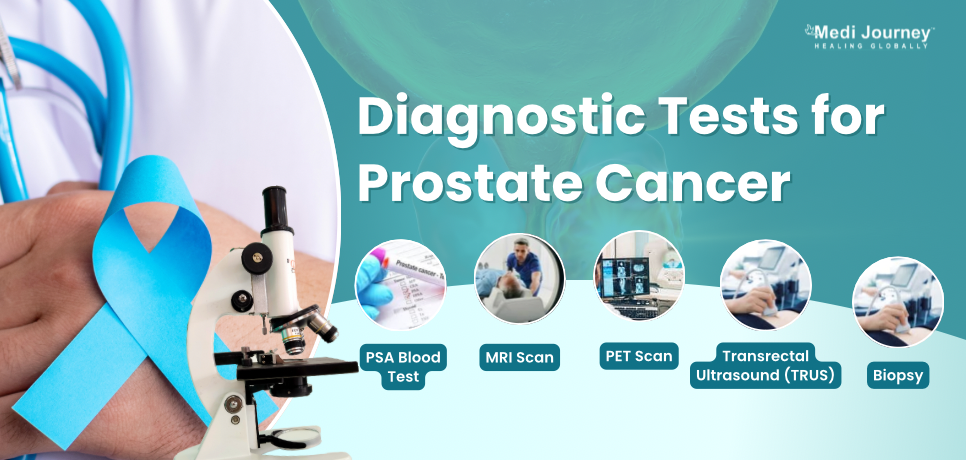PCOS and PCOD: Learn the Symptoms, Differences, and Treatment Options
 21 November,2024
Read More
21 November,2024
Read More
Enquire now in case of any assistance needed
 22 March,2024
22 March,2024

Prostate Cancer is a form of cancer that begins in the prostate gland, which is a small walnut-shaped gland that produces seminal fluid. With over 1.4 million cases in 2020, prostate cancer has become the second most common cancer among men. Overall, it is the fourth most common cancer in the world.
Being diagnosed with cancer of the prostate can be a daunting experience. But here's some positive news. The death rate due to prostate cancer is declining year on year. With advancements in medical sciences, the prognosis of prostate cancer has significantly improved. 99 of 100 people diagnosed with prostate cancer that is localized and not spread to other body parts are alive five years later. It means early diagnosis and treatment are necessary for curing prostate cancer.
This blog aims at spreading awareness about prostate cancer and providing information regarding various aspects of the disease, including its causes, symptoms, diagnosis, prevention, and treatment options.
Prostate gland cancer begins when the cells in the prostate start to grow uncontrollably. Over time, cancerous cells can spread to other body parts, such as the bones and lymph nodes. It primarily affects older men, with the average age of diagnosis being around 65 years old.
While prostate cancer can be slow-growing without causing any symptoms in its early stages, it is still important to detect and treat it as early as possible to increase the chances of successful outcomes. Types of prostate cancer include –
Other rare types of prostate cancer include neuroendocrine tumors, sarcoma, small cell carcinoma, and lymphoma.
At its early stages, prostate cancer often does not show noticeable symptoms. However, as the cancer progresses, certain signs may manifest. These signs can include –
If you experience any of these symptoms, it is essential to consult an oncologist for further evaluation.
It's important to note that while these symptoms can be indicative of prostate cancer, they can also be caused by other conditions, such as benign prostatic hyperplasia (BPH) or urinary tract infections. Therefore, a thorough medical examination is crucial to determine the underlying cause of these symptoms.

Diagnosing prostate cancer involves a combination of screening tests and further diagnostic procedures. Standard screening tests include –
The exact reason for developing prostate cancer remains unknown. However, prostate cancer develops when the cells in the prostate gland go haywire and start multiplying in an unorganized and unregulated manner. Mutations are responsible for causing damage to the division cycle of the cells in the body.
Researchers have identified multiple risk factors that increase the likelihood of developing this disease. Advancing age is the most notable risk factor, with the majority of prostate gland cancer cases occurring in men over the age of 65. Other risk factors include –
Research suggests that inflammation in the prostate gland may also play a role in the development of prostate cancer. Chronic inflammation, often caused by untreated infections or other conditions, can lead to DNA damage and an increased risk of cancerous growth.
Exposure to certain chemicals and environmental toxins, such as Agent Orange, cadmium, and pesticides, is associated with an increased risk of prostate cancer.
Furthermore, hormonal imbalances, specifically high levels of testosterone or dihydrotestosterone (DHT), have been associated with an increased risk of prostate cancer. These hormones can stimulate the growth of cells in the prostate, potentially leading to the formation of cancerous tumors.
While it is not always possible to prevent prostate cancer entirely, certain lifestyle choices and habits help lower the risk of having this condition. These include –
It's important to note that while these lifestyle changes and dietary additions can help lower the risk of prostate cancer, they are not foolproof methods. Age and genetic factors also play a significant role in the development of this disease.
Therefore, it's essential to consult with an oncologist to create a personalized plan that considers your risk factors and overall health status.

The treatment for prostate cancer may vary depending on factors such as the stage of the cancer, overall health, and personal preferences. Standard treatment options include active surveillance (monitoring the cancer without immediate treatment), surgery to remove the prostate gland (prostatectomy), radiation therapy, hormone therapy to block the effects of testosterone, chemotherapy, and immunotherapy. Treatment decisions should be made in consultation with a healthcare team, considering the individual's unique circumstances and preferences.
Regular and clear communication is crucial in making informed decisions about your health care. Bringing someone with you for your doctor's appointments would be helpful. Consider asking your healthcare team the following questions:
Prostate cancer is the second most common cancer in men worldwide, with a higher incidence in older individuals. It is a prevalent form of cancer that primarily affects men, particularly those above the age of 65. Regular screenings, such as prostate-specific antigen (PSA) tests and digital rectal exams, can aid in the early diagnosis of prostate cancer when treatment is most effective. Men must be proactive about their health and discuss any symptoms or concerns with the doctors to ensure timely diagnosis and appropriate management.
Doctor of Pharmacy
Dr. Deepanshu Siwach is a skilled clinical pharmacist with a Doctor of Pharmacy degree. He has 4+ years of experience and has worked with thousands of patients. He has been associated with some of the top hospitals, such as Artemis Gurgaon and Teerthanker
Dr. Vivek Gupta is an experienced Surgical Oncologist with over 16 years of practice....
Senior Consultant
Medical Oncologist
Nanavati-Max Super Speciality Hospital, Mumbai
Book an Appointment Talk To ExpertSenior Director
Gynecologist and Obstetrician, IVF Specialist
Max Super Speciality Hospital, Shalimar Bagh, New Delhi
Book an Appointment Talk To ExpertSenior Director
Gynecologist and Obstetrician, IVF Specialist
Max Smart Super Speciality Hospital, Saket, New Delhi
Book an Appointment Talk To ExpertSenior Director
Gynecologist and Obstetrician
Max Smart Super Speciality Hospital, Saket, New Delhi
Book an Appointment Talk To ExpertSenior Director
Gynecologist and Obstetrician
Max Smart Super Speciality Hospital, Saket, New Delhi
Book an Appointment Talk To ExpertSenior Director
Gynecologist and Obstetrician
Max Smart Super Speciality Hospital, Saket, New Delhi
Book an Appointment Talk To ExpertFill up the form and get assured assitance within 24 hrs!
The Art of Effective Communication
 05 November,2024
Read More
05 November,2024
Read More
 29 October,2024
Read More
29 October,2024
Read More
 28 October,2024
Read More
28 October,2024
Read More
Trusted by Patients
"I am Asim from Bangladesh and was looking for treatment in India for neuro. I visited many websites to get the complete information regarding the treatment but I was not satisfied as I was getting confused. In the meanwhile, one of my friends suggested I seek help from Medi Journey as he experienced his medical journey very smoothly and was satisfied with it. They have filtered the top 10 doctors as per experience, the success rate of surgery & profile, so it helps us to choose the best treatment in India. "
"For my knee surgery, Medi Journey guided me to BLK Hospital where I received exceptional care. The team's support and the expertise at BLK Hospital exceeded my expectations. Thank you Medi Journey for making my medical journey stress-free. "
"I came from Iraq for my granddaughter's eye surgery in India facilitated by Medi Journey, due to critical cases they advised us to get a second opinion from the different hospitals before going to surgery. Finally, we went to Fortis Escort Hospital, which helped us to get more confidence for diagnosis. Fortis Escort Hospital has the best eye surgeon team with the latest instruments. Thanks to all team members for providing a high-quality treatment in India at an affordable cost. "
"I came for my hair transplant in India, before coming I was so confused about choosing the best clinic and surgeon for me. But thanks to God one of my friends had a hair transplant in India through Medi Journey. He recommended me to go with them. I am completely happy with my experience with them. They were always very fast in their responses to me. the success rate of my hair transplant surgery is 100%."
"Artemis Hospital, suggested by Medi Journey, turned out to be a great choice for my treatment. The personalized assistance and medical care were exceptional. I'm grateful to Medi Journey for guiding me to a hospital that perfectly matched my needs. Highly recommended! "
"I came from Afghanistan for my treatment in India at Jaypee Hospital, Noida. I had a fantastic experience with Medi Journey. Kudos to them for their incredible support during my medical journey. They not only took care of all the logistics but also connected me with a fantastic healthcare team. Efficient, caring, and highly recommended for a hassle-free medical tourism experience."
"I am Adam from Kano, Nigeria, one of my friends from Nigeria was facilitated by Medi Journey, and he recommended us to go with them. I sent my all reports to them and within 48 hours they reverted with 4 options from different hospitals. They helped me to get a Visa letter from the hospital, arrange pick-up from the airport, and book a hotel for me. Their team is very honest and throughout our stay in India they are with us they are caring for us like his family members. BLK Hospital is the best hospital in India with a top surgical oncologist surgeon team, a very advanced OT, and a Radiotherapy department. I wish more success to Medi Journey. "
"Great experience at the Max Hospital for my spine surgery and was successfully done. I thank my neurosurgeon and his entire team. I recommended all of my country's people to Medi Journey for treatment in India, they choose the best hospital, the best doctors, and the best cost for patients."
"I came to India from Dhaka, Bangladesh for my father-in-law's cardiac surgery at Fortis Hospital. I was confused about choosing the best surgeon for him before coming, but their team helped me to choose the best hospital and best cardiac surgeon in India with very good cost and 100% success rate of surgery. I am very happy with the services, really they make my journey so comfortable that make me feel at home. Thanks again and I like people to choose "Medi Journey" as your travel guide. "
"I am Mohammad from Bangladesh came to India for my general health checkup. Medi Journey offers me the complete package including Pick-up from the airport, hotel services, and 24-hour assistance. They guide you to choose the best hospital in India, the best cost of treatment with top-most doctors and give you complete information about hotel booking, and pick-up from the airport before coming to India They have the best team to help. Always choose Medi Journey for your treatment in India."





